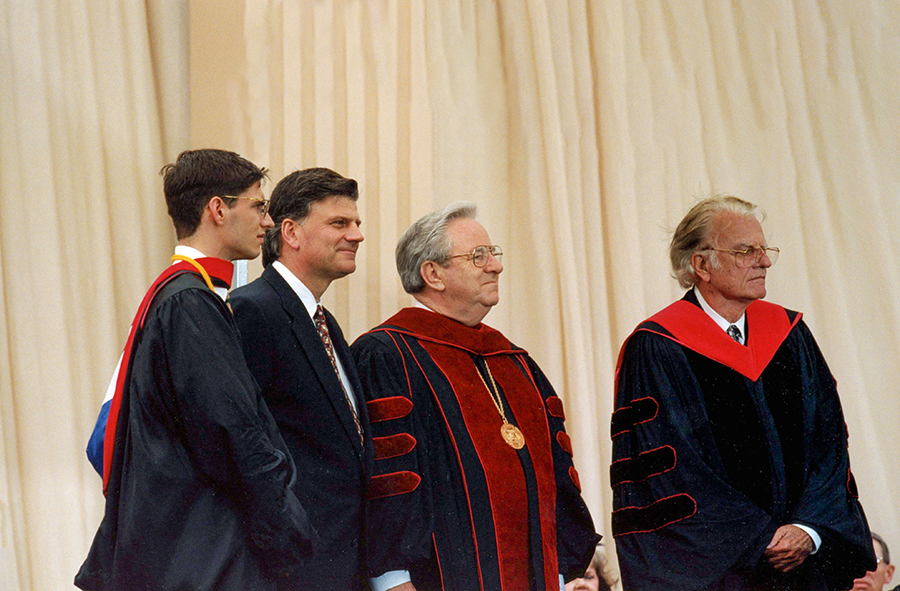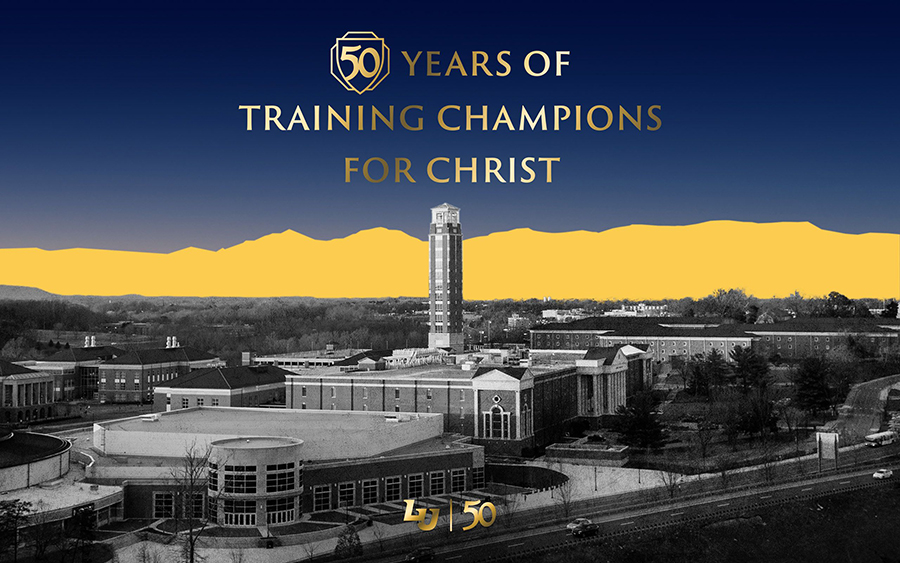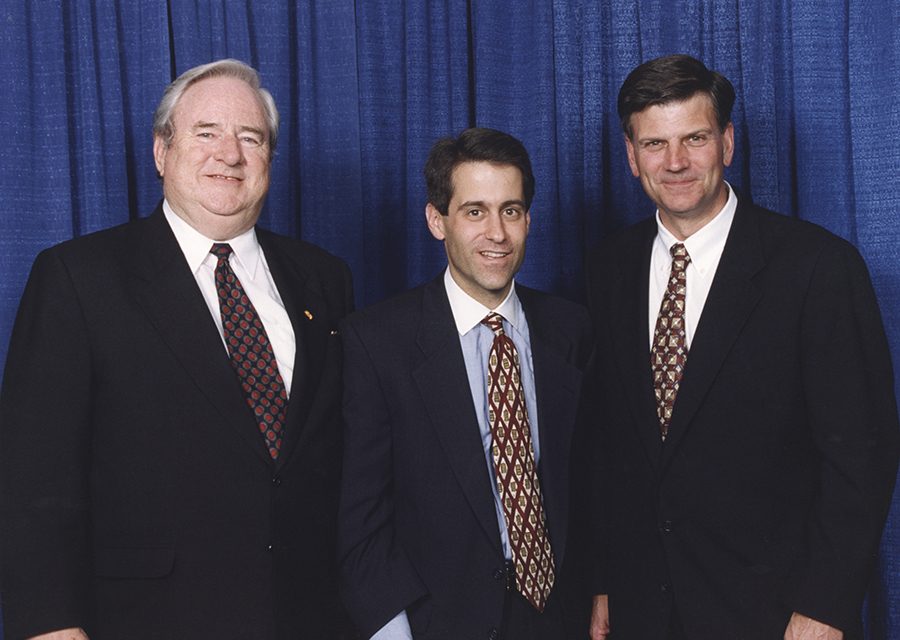I was hosting clients from Washington, D.C., in the conference room of my Atlanta-based public relations firm on Tuesday, May 15, 2007, when a colleague walked in and interrupted with the shocking news. “CNN is reporting that Dr. Falwell has died. I’m sorry,” she said, “I know how much you loved him.” I asked our guests to excuse me, and I headed to the airport, flew to Lynchburg, Virginia, and drove straight to the Falwell home—a home I had visited too many times to count over many years. I just wanted to hug Mrs. Falwell.
Twenty-eight years earlier, Jerry Falwell was at our front door in Philadelphia to console my family. My father and Jerry’s close friend, Arthur S. DeMoss, had dropped dead of a heart attack at age 53. Jerry returned a week later to speak at his memorial service. The following year, 1980, I arrived at Liberty University (then Liberty Baptist College) as a freshman walk-on placekicker on the football team, and Jerry Falwell quickly became like a second father to me. He and Macel opened their home to me and made me feel like part of their family. Mrs. Falwell often introduced me to people as her “third son.”
Now, on the 15th anniversary of his death, I’m proud to reflect on Jerry Falwell’s impact on my life. I turned 60 recently, and after my own father, who was my hero, no man has influenced my life more than Jerry Falwell. He was a father figure, a mentor, a boss and a client. Nearly 30 years his junior, I was, at times, his right-hand aide, advisor, confidant and board member. I was, at all times, his friend.

Upon graduation from Liberty, I went to work in Jerry Falwell’s office. Before long I found myself handling his schedule, sitting in his meetings, traveling with him across the country, facilitating media appearances and interviews, and serving as his chief spokesperson. Most days, for nearly eight years, I was the first person he called in the morning and the last person he called at night.
My time in Jerry’s office coincided with the height of the influence of the Moral Majority and the Old Time Gospel Hour, the weekly broadcast ministry of his Thomas Road Baptist Church. We were moving past the pioneering days of Liberty University and experiencing exciting growth in enrollment and campus construction.
Yet I always knew that at his core, Jerry Falwell was a pastor—a lover of Jesus and of people. It is his pastor’s heart that I believe still marks him 15 years after his going to Heaven. I not only experienced this, but as the keeper of his calendar and schedule, I knew without asking that he would conduct virtually any wedding or funeral. I knew he would offer counseling to anyone who needed it, regardless of the hour. I knew he was comforting the sick and the dying at Lynchburg’s two hospitals many times each week until his death. His day always seemed to have more than 24 hours. He was a better friend than most of us deserved.
Just seven years after my father’s death, my brother David was killed in a car accident, a year before he would have graduated from Liberty, and Jerry was on the scene again being a pastor to a grieving family. Two years later, Jerry was in Atlanta to help officiate my marriage to April. Though my father and kid brother missed the happiest day of my life to that point, it meant everything to me to have Jerry Falwell by my side. Then, he was at the hospital when our first two children were born. It seemed Jerry had the ability to be everywhere that mattered—not just for me, but for everyone.
Jerry Falwell was known as many things—a TV preacher, fundraiser, marketing genius, visionary, crusader and social commentator, political organizer and influencer, and a man of extraordinary faith. I witnessed all these sides of him in public and behind the scenes, often as the passenger in his GMC Suburban while he drove around the Liberty campus.
It was during one of those rides in 1989 that we discussed dissolving the Moral Majority to devote more time and energy to Liberty University and Thomas Road Church. He made that announcement during a speech to the Religion News Association gathered in Las Vegas for their annual convention. Even his harshest critics acknowledged the outsized influence of Jerry Falwell and the Moral Majority on national debate and in giving a voice and platform to tens of millions of conservative people of faith in America.
I accompanied Jerry to the Republican National Convention (RNC) in 1992 and remember attending a pre-session walk-through and briefing on the day he was scheduled to deliver the benediction to a national television audience. Sitting in a small meeting room backstage in the Houston Astrodome, an RNC official asked Jerry for a copy of his prayer. “I haven’t prayed it yet,” he said, without missing a beat. He was not about to let someone tell him he couldn’t pray in Jesus’ Name!
It wasn’t his ability to manage the spotlight of attention that came from prestigious speaking engagements and countless television appearances and media interviews that impressed me about Jerry. Rather, his unwavering commitment to be in his pulpit at Thomas Road Baptist Church virtually every Sunday morning, regardless of where he might have been on Saturday evening, made a lasting impression on me as to what he considered most important in his multifaceted life. It was also his insistence on standing down front after every speaking engagement to shake every hand and speak with every person who wanted his hand or his ear. This was true whether he was in Los Angeles and would get home at 3 a.m., or at Thomas Road and would be an hour late for lunch.

Jerry always kept his priorities in proper order. His family came before his ministry. If a request to appear on CNN’s Larry King Live or ABC’s Nightline conflicted with a birthday party or otherwise important event for his family, Larry King and Ted Koppel were going to draw the short straw. I know because it fell to me to tell them. Even as a young single man I admired that, and his example continues to serve me well 30 years later as a father and grandfather.
Speaking of media, Jerry viewed every media interview or appearance as a God-given opportunity to present the Gospel—the death, burial and resurrection of Jesus Christ. In this he was faithful until God suddenly called him home at age 73. Despite media caricatures and analyses of him, it wasn’t politics or public attention that drove him—it was the Gospel.
Jerry handled notoriety better than anyone I’ve ever known. Television and his commanding presence made him seem larger than life—but he never thought he was more important than you. He was self-deprecating, approachable, pastoral, tender, gentle and kind. If you had a problem, he had an ear—and time. Though he outworked all of us on his staff, he never seemed in a rush.
For such a polarizing figure, Jerry Falwell was personable and winsome. I suppose that’s why ideological adversaries such as Sen. Ted Kennedy, the Reverend Jesse Jackson and pornographer Larry Flynt counted him as a friend. Falwell had sued Larry Flynt in 1983 over crude ad parody in his magazine—a case that went all the way to the Supreme Court. Flynt won a landmark decision in Hustler Magazine v. Falwell, and the two men later became good friends. Jerry reached out to Flynt and would visit him when in California, and Flynt never forgot it. After Jerry’s death in 2007, Larry Flynt wrote an op-ed for the LA Times titled “My Friend, Jerry Falwell,” a touching tribute to what’s possible when adversaries see each other as people.
After working closely with Jerry for eight years, I decided to start my own public relations firm. When I told Jerry, he said, “Well, I want to be your first client.” As I prepared to move to Atlanta, Jerry asked me to join the board of trustees at Liberty University—the school I loved and had high hopes would achieve all that its founder had envisioned—“a world-class university that would be for evangelical Christian young people what Notre Dame was for Catholics and Brigham Young was for Mormons.” I was proud to serve on that board for 24 years.
I closed my PR firm in 2019, when, I believe, it was the largest PR firm in the country serving Christian organizations and causes. I credit Jerry Falwell for that, too. For it was at his side that I learned about leadership, public relations, media relations, messaging, branding and influencing public opinion.
In the years since his death in 2007, the growth of Liberty University has been, by virtually any measurement, both remarkable and undeniable. What is also undeniable, in my view, is the role that God played in that growth. Jerry would have been the first to acknowledge God’s unmistakable hand in whatever success Liberty has achieved. Never one to take himself too seriously, Jerry knew that humanly speaking there was no way a Baptist college founded by someone who was not an educator, in a small town in Central Virginia, could become a highly respected national university unless God Himself had ordained it and provided the necessary resources.
But Jerry Falwell also deserves more credit than he has been given by some since his death 15 years ago. While Jerry didn’t live to experience real financial prosperity at Liberty, he did lay the foundation and the groundwork for the financial resources that have funded one of the most remarkable campus expansions in American higher education.

My mentor didn’t build a large endowment, but he endowed Liberty with the things that mattered most—a distinctively Christian worldview, prayer, godly character and integrity. He built the foundation of a university that would be worthy of people’s contributions toward future endowment. He didn’t live to see enrollment top 100,000, but his faith, life and work ethic paved the way for such growth.
It was our founder who instilled in those who were part of Liberty in the ’70s, ’80s, ’90s and early 2000s that, “If it’s Christian, it ought to be better.” He believed in excellence, and even more so if we called ourselves Christians. He was passionate about “training champions for Christ,” young men and women who would graduate into every field and sphere of influence in society to make a lasting difference for Christ.
My life and world were forever impacted by Jerry Falwell and the university he started when I was just 9 years old. Though I served him in some capacity for more than half my life, he gave me far more than I gave him. For that I’m eternally grateful. ©2022 Mark DeMoss
Mark DeMoss has been in the public relations business nearly 40 years. He is the author of “The Little Red Book of Wisdom.”
Photo: Courtesy of Thomas Road Baptist Church
